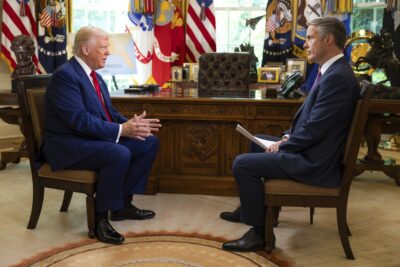Did Donald Trump – or ABC News – choose who would interview the president? Why does it matter?
By Canadian Press on May 1, 2025.

NEW YORK (AP) — During a contentious exchange about deportations in his interview with ABC News’ Terry Moran this week, President Donald Trump brought up — from his perspective — how Moran had gotten into the White House in the first place.
“They’re giving you the break of a lifetime, you know,” Trump said in Tuesday’s prime-time broadcast. “You’re doing the interview. I picked you because, frankly, I never heard of you, but that’s OK.”
Emphasizing again that it was his choice that Moran was there, the president scolded, “You’re not being very nice.”
From an ethics perspective, it’s considered a breach for a news organization to let a newsmaker dictate who will conduct an interview. In the real world of competitive journalism, things aren’t always so simple.
Did ABC News let President Trump decide who would do the interview?
We don’t know. ABC on Thursday would not talk publicly about what arrangements were discussed after Trump agreed to speak to the network about the first 100 days of his administration. ABC privately pushes back against the notion that Trump was given a list of potential interviewers, but it’s unclear whether other names came up.
On its face, Moran would seem an unexpected choice. At 65, he’s been with the network since 1997 and was chief White House correspondent during George W. Bush’s first term. He had nine one-on-one interviews with Barack Obama.
But his profile at ABC News has diminished. He’s an anchor for the “ABC News Live” streaming service and covers the Supreme Court for the network.
There would seem to be more obvious alternatives, like “World News Tonight” anchor David Muir, effectively the face of the news division. Mary Bruce is the current chief White House correspondent. Jonathan Karl has written three books about Trump and rotates as a host of the “This Week” Sunday show with Martha Raddatz.
Only George Stephanopoulos would seem off the table, since Trump sued him for defamation in a case settled last December.
Why would a news organization not want to cede the choice of an interviewer to the president? “It undermines our independence as journalists,” said Kelly McBride, a media ethics expert and senior vice president at the Poynter Institute. “When we make decisions of what questions are going to be asked, who’s doing the interview and how we edit the interview, we do it in service to the audience.”
“If we let the powerful person that we are attempting to get information from choose who does the interview or select the questions, we’re breaking our promise to the audience that we would be acting on their behalf,” she said.
The power of a president
Practically speaking, however, a president has a great deal of power in these dynamics.
Whatever the well-established challenges inherent in interviewing Trump, news organizations prize an exclusive interview with the president, any president. At any given moment, his press office likely has many requests for interviews, usually with a specific journalist’s name attached. He already has choices.
The Trump administration has made no secret of its desire to wield more control over who questions the president. Press Secretary Karoline Leavitt has invited new, mostly friendly, journalists into the White House briefing room and talked about further changes in who is allowed there. The administration sparked a court fight with The Associated Press over access to the Oval Office.
When he worked as a news executive at CNN and NBC News, Mark Whitaker said he would discuss interviews with the White House involving certain journalists, but “the idea of giving a choice is not something I ever saw.” he said.
Andrew Heyward, a former CBS News president, said he understands the principle of not ceding the decision of who asks the questions, “but as a practical matter, it’s often a negotiation.” Heyward stressed he had no inside information about what happened with ABC News this week.
The ‘Wild West’ days of competition for celebrity interviews
In some cases, the importance of landing an interview ahead of a competitor can take precedence over the principle of controlling who does the asking. Its value is illustrated in the ratings: nearly 4 million people watched Moran’s interview with Trump on Tuesday, the largest audience of anything on television that night, the Nielsen company said.
There was even more at stake during the “Wild West” days of television networks competing for big celebrity interviews, primarily at the end of the last century.
“Shamefully, the interviewee was in the driver’s seat whenever it came to the flavor-of-the-week or the most sought-after new interview,” said veteran broadcast journalist Connie Chung. “It was one of the reasons why I despised getting the so-called ‘get.’ It was a matter of who could grovel better.”
On many of those occasions, news organizations didn’t always speak with one voice; Diane Sawyer and Barbara Walters often competed fiercely for the same interviews when they both worked at ABC News. In 2001, Chung recalled that Walters was designated by ABC to interview scandal-scarred U.S. Rep. Gary Condit, but the congressman’s representative said they were going to another network unless Chung did the story. Chung got the interview.
So what if the day’s big celebrity is the president of the United States?
“It is a bit of a gray area,” Heyward said.
___
David Bauder writes about the intersection of media and entertainment for the AP. Follow him at http://x.com/dbauder and https://bsky.app/profile/dbauder.bsky.social.
David Bauder, The Associated Press
-30


